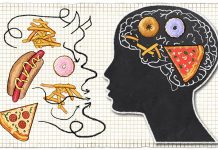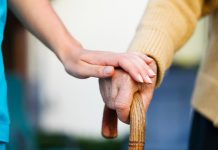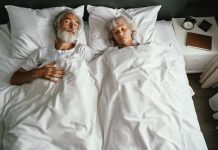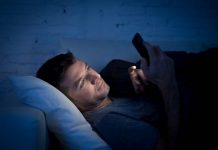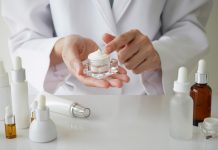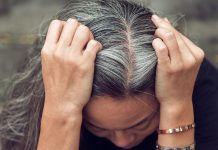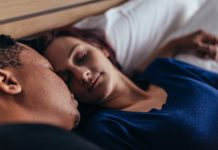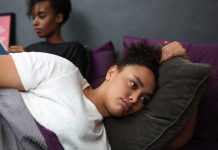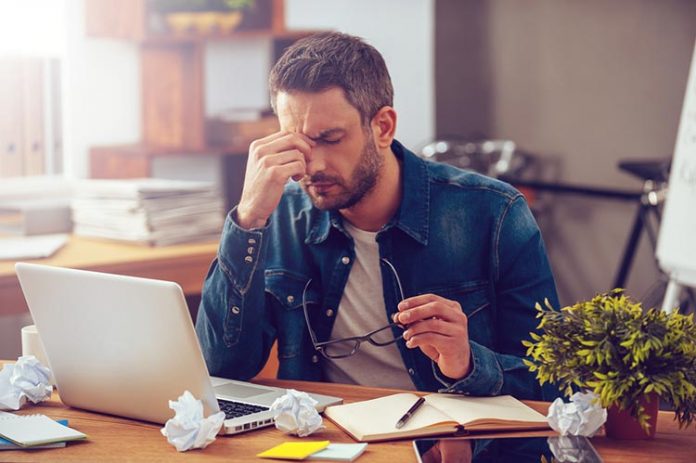Getting enough sleep may be low on the totem pole in our busy modern world, but the health consequences of sleep deprivation are real—and they add up over time.
Your brain doesn’t work as well
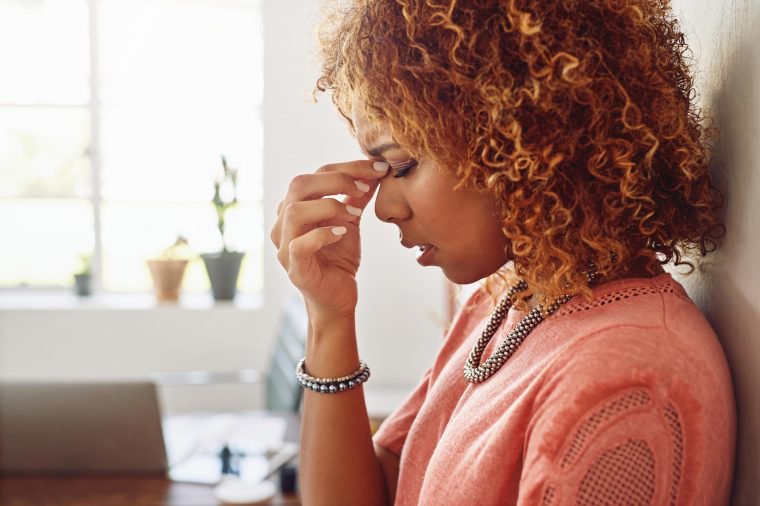
According to the CDC, insufficient sleep is a public health problem, with more than a third of adults in the U.S. getting less than the recommended seven to eight hours per night. When you don’t get adequate sleep—whether due to a chronic issue like sleep apnea, lifestyle reasons like long work hours or raising young children, or bad habits like bingeing on Facebook before bed—it takes a toll on your brain’s ability to function. “MRI imaging shows lack of sleep reduces blood flow to areas of the brain that control higher level thought processes,” says Richard Shane, PhD, a behavioral sleep specialist and the founder of the Sleep Easily method. “It impairs your problem-solving abilities, slows your cognitive speed, and decreases constructive thinking skills and logical reasoning.” Your noggin needs time to rest and repair—one study of chronic insomniacs showed they had smaller, less dense brains than people who were well-rested. To help you prep for a good night of sleep, check out these 19 daily habits for better sleep.
You become forgetful

Another effect of sleep deprivation is an inability to retain memories. “Insufficient sleep interferes with your ability to focus and learn efficiently, which is essential for you to remember something,” Dr. Shane says. “Research shows that sleep strengthens nerve connections involved in memory, and also helps consolidate new information into memories. Insufficient sleep interferes with this.” Michael J. Breus, PhD, a clinical psychologist known as “The Sleep Doctor,” explains that you need enough REM (rapid eye movement) sleep in order for your brain to solidify memories. “REM sleep is where you move information from your short term memory to your long term memory,” he says. “When you do not get enough sleep, you miss out on REM, and this effects memory.”
You get irritable
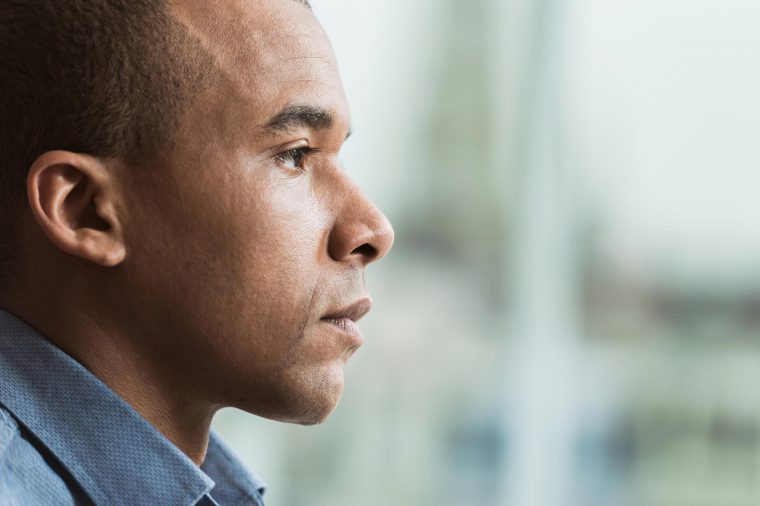
You’ve probably noticed that you wake up “on the wrong side of the bed” if you haven’t gotten enough shut-eye. “Sleep deprivation affects mood,” Breus says. “It makes you see everything in a more negative light because your emotions are far more volatile when sleep deprived.” Although it’s not known exactly why this is, Shane says it’s another way your brain doesn’t function well without sleep. “The area of your brain [frontal lobe] that’s in charge of thinking, reasoning, and logic usually balances the area of your brain [amygdala] involved with emotions such as fear, anxiety, aggression, and arousal,” he says. “MRI brain scans on people who have not had enough sleep show a decrease in connection between these brain centers, which increases reactivity, fear, and anger.” If you keep waking up in the middle of the night, your brain could be in big trouble.
You’re more likely to be depressed
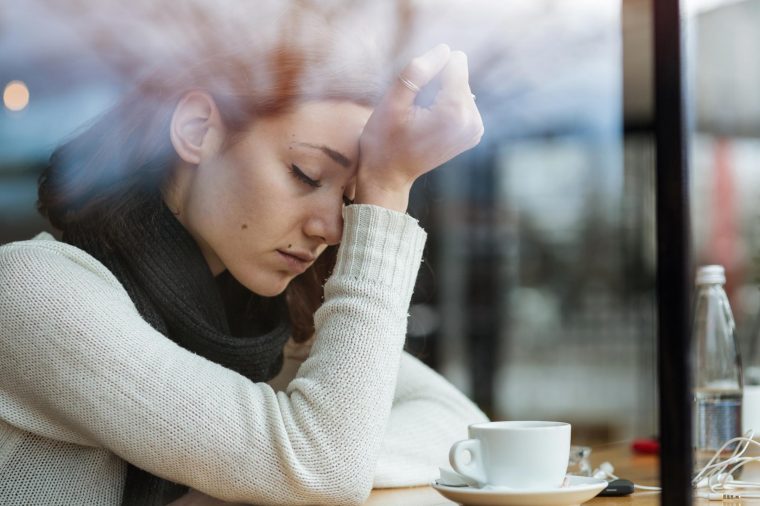
Another mood disorder linked to lack of sleep is depression. “While the specific brain mechanisms are not known, in one major study people with chronic insomnia were ten times more likely to develop depression,” Dr. Shane says. Sleep apnea, a breathing issue while sleeping, is also linked with depression—one study showed that people who were depressed were five times as likely to have the condition. Because lack of sleep and depression are so interconnected, it can be hard to tease out which came first. The National Sleep Foundation suggests keeping a sleep diary to help your doctor diagnose you and decide the best treatment approach.
You make bad judgments
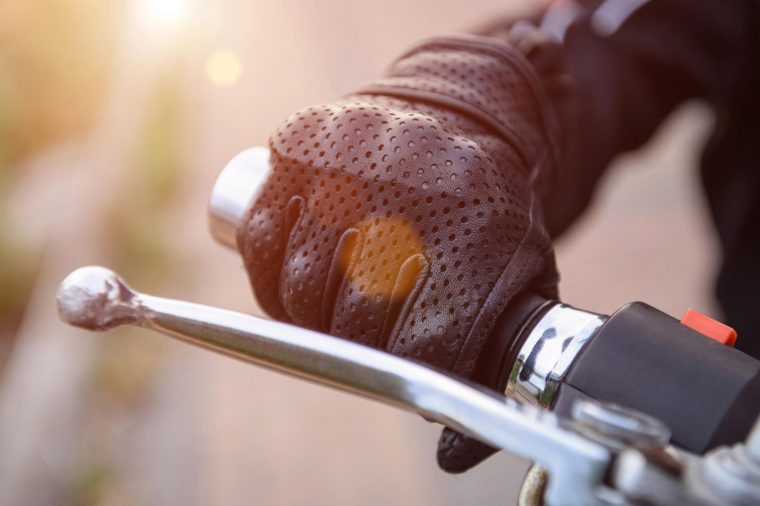
Along with fuzzy brain function comes impaired decision making. “Sleep has been shown to increase risk-taking behavior,” says Clete Kushida, MD, medical director of the Stanford Sleep Medicine Center. In a study of pediatric residents on 24-hour shifts, the doctors made riskier medical decisions if they hadn’t gotten at least an hour nap. Harvard Medical School’s Division of Sleep Medicine says sleep deprivation played in role in many infamous disasters including the nuclear meltdown at Chernobyl, the Exxon Valdez oil spill, and the explosion of the Challenger. But even if your job seems to have less potential for disaster, your performance at work may still suffer because of poor problem solving, higher risk-taking, and poor management style without sleep, says Breus.
You may become a dangerous driver

Sleep deprivation doesn’t only endanger your own health—it can affect the lives of others if you get behind the wheel. “Sleep has been shown to decrease your ability for alertness, vigilance, and higher order cognitive functions such as executive/frontal-lobe functioning—for example, complex activities like driving a car,” says Dr. Kushida. It can slow your reaction time as much as driving drunk, not to mention the risk of falling asleep behind the wheel! The National Highway Traffic Safety Administration says that drowsy driving is responsible for an average of 82,000 crashes a year, 886 of them fatal. If you feel sleepy while driving, open the window, turn up the radio or pull over for a 20-minute cat nap to refresh you. Nothing is as restorative as sleep, but when you’re feeling lethargic, these simple energy boosters can help.
Your heart could suffer
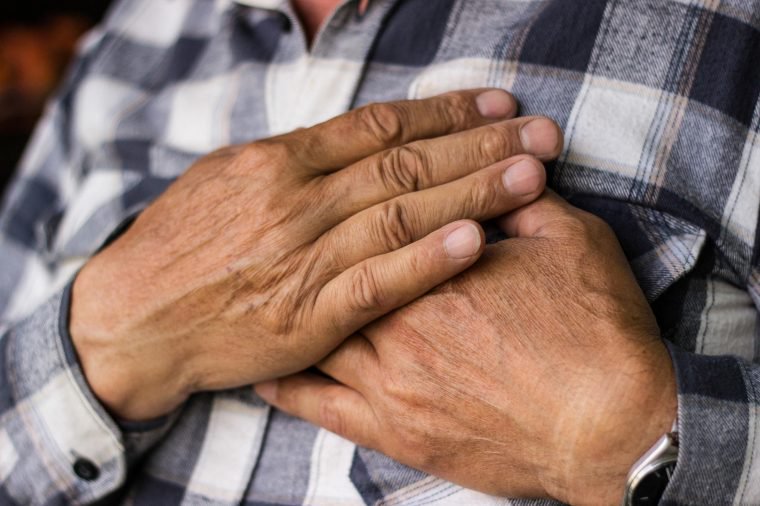
You may think the only effect of sleep deprivation on your body is that you’re really, really tired. But what happens when you don’t get enough sleep is that every system in your body is affected, potentially causing long-term effects on your cardiovascular health, including your risk for high blood pressure, heart attack, and stroke. For people with the breathing issue sleep apnea, the risk is even greater. “Different sleep states such as REM and non-REM have variable and complex impacts on heart rate, blood pressure, blood flow to heart, and breathing patterns,” says Vaishal Shah, MD, a staff physician in the Sleep Disorders Center at Cleveland Clinic. Sleep apnea disrupts this pattern, and the result is that the cardiovascular system has to work harder. But even in people without a specific sleep disorder, lack of sleep has been linked with high blood pressure and heart problems, likely due to not getting enough time to slow down and recover from the day. Don’t ignore these symptoms of sleep apnea.
Your skin looks haggard
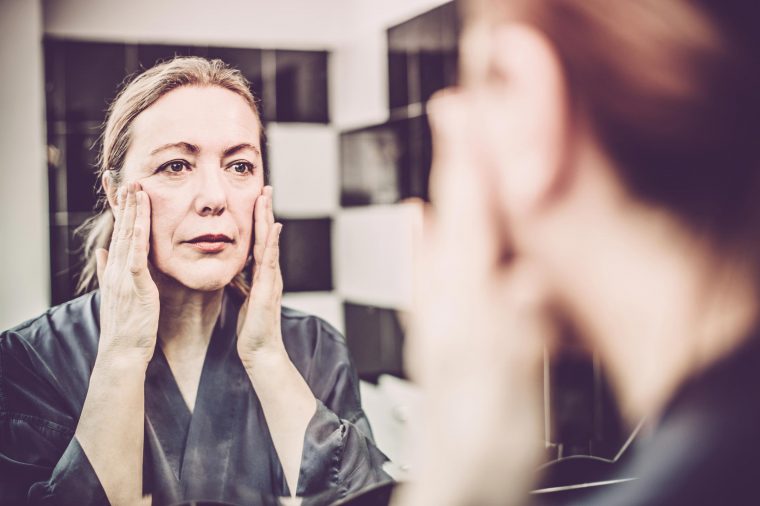
Turns out, “beauty sleep” is a real thing, studies show. “Sleep plays an important role in the regeneration of cells and has effects on inflammation in the body, which is important for healing and in some skin problems,” says. Dr. Shah. “Skin is also an important organ which helps regulate body temperature during sleep. So, darkening below the eyes, dull skin, or puffy eyes can be a visible symptoms of lack of sleep.” Research has even shown that people who need more sleep are considered less attractive. (Mental note: Don’t tell anyone they look tired, because it’s an insult after all!)
You gain weight
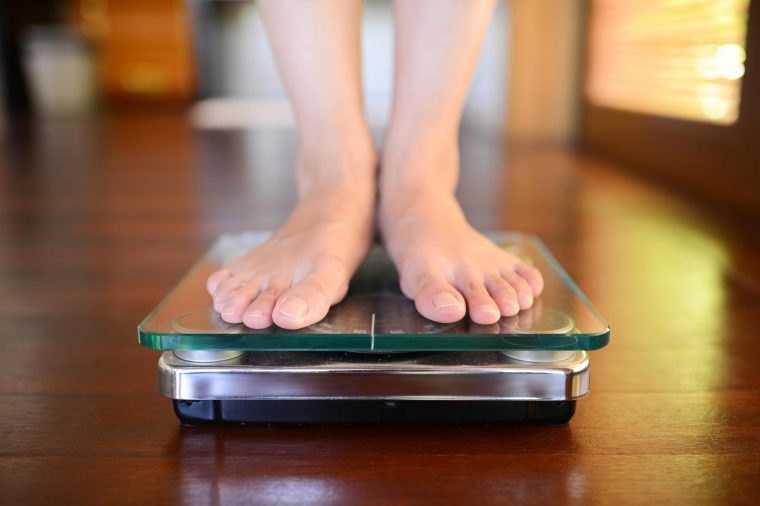
Studies show that an unwanted side effect of lack of sleep is weight gain. “There is growing evidence that sleep deprivation interferes with hormones involved in weight regulation,” says Carl Bazil, MD, director of the Division of Sleep and Epilepsy at New York-Presbyterian/Columbia University Medical Center. Dr. Shah says two specific hormones that regulate eating behavior are affected. “Ghrelin, which increases appetite, is high in people with sleep deprivation,” he says. “On other hand, levels of leptin, which lowers appetite, has been found to be low in sleep-deprived people.” One study showed those who were sleep deprived consumed 300 more calories a day than those who were well-rested. You also may gain weight because your metabolism slows down in order to conserve energy when you’re tired. In addition, research has shown an increased risk of diabetes, which is also connected to being overweight and obese, in people who got less than seven hours of shuteye a night. These are the sleep disorders you need to know about.
Your sex drive drops

If you’ve ever told your partner, “I’m just too tired tonight,” it might not just be an excuse. “Fatigue and sleepiness tends to decrease sex drive, in addition to lowering testosterone in men with sleep loss,” Dr. Kushida says. One study showed that sex hormones were as much as 10 to 15 percent lower in those who had slept less than five hours a night. Research has also linked sleep apnea with low testosterone.
You’re more likely to get sick
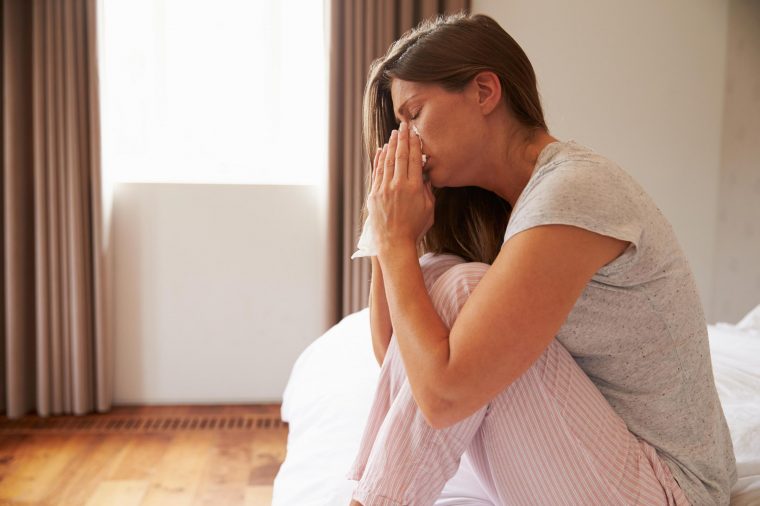
If you feel like you always come down with a cold when you sleep less, it’s not just in your head. “Studies have demonstrated that a lack of sleep can impair specific parts of the body’s own immune system and its response to infections,” Dr. Shah says. So, not getting enough sleep can increase the chance that exposure to a cold virus will result in you actually getting sick. In addition, vaccines’ effectiveness could be compromised. “Lack of sleep decreases the chance that immunizations will be effective in preventing such diseases as hepatitis B,” Dr. Bazil says. “And by inference, other aspects of the immune system are almost certainly affected, contributing to the risk of diseases including cancer.”
You have no energy for exercise
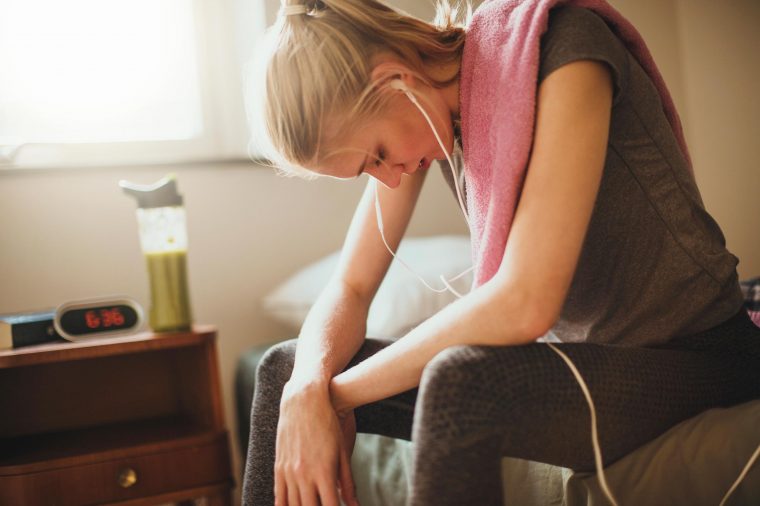
Skimping on sleep will almost definitely lead to less motivation for working out. “You’re going to exercise less if you’re constantly tired,” Dr. Bazil says. And if you do exercise, your athletic performance may suffer due to a slower reaction time and less energy, as a study of college basketball players showed. Less exercise means also more weight gain and poorer overall health. Try these little changes you can make to sleep better in just one day.
Sleepiness leads to more sleepiness
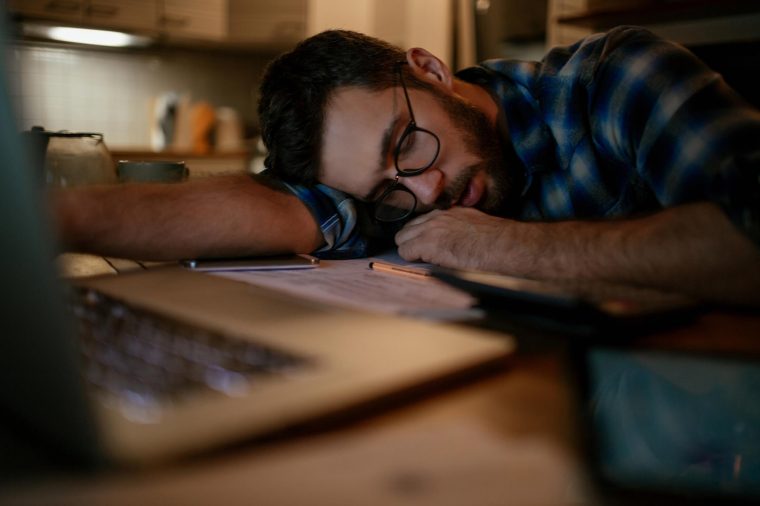
There’s a myth you can “get used to” sleeping less—in fact, functioning on a short amount of sleep is almost a badge of honor. But Dr. Bazil says this is “absolutely not” the case. “On the contrary, there is considerable evidence that ‘sleep debt’ accumulates with continued sleep deprivation, resulting in further deterioration in alertness, concentration, and memory function,” he says. Dr. Shah says this sleep debt just makes you feel sleepier and sleepier during the day, and can persist even after a night of “catch up” sleep. And you know that feeling of confusion when you wake up from a deep sleep? Dr. Bazil says it’s called “sleep drunkenness,” and it’s more likely among people who are sleep deprived, as the body tries to recoup by spending more time in that deep state. In order to get better sleep, our experts recommend going to bed and waking up at the same time every day, limiting caffeine and alcohol close to bedtime, exercising earlier in the day, getting 15 minutes of sunlight to set your body clock, dimming the lights in the evening, avoiding screen time before bed, and keeping your bedroom dark and cool. These are the other secrets to better sleep that sleep doctors want you to know.
Source: RD









